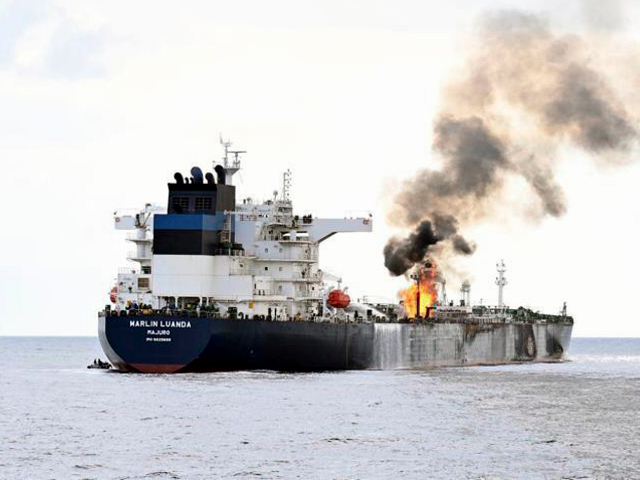Insurance costs for Red Sea transit have risen by up to 50 percent since the Iran-backed Houthi terrorists of Yemen began attacking commercial vessels with missiles, drones, and hijacking crews, and some insurance companies are reportedly backing away from Red Sea business entirely.
Reuters reported on Wednesday the highest insurance premium spikes are hitting ships tied to the United States, United Kingdom, and Israel because the Houthis have vowed to continue targeting those ships until Israel halts its war against the Hamas terrorists in Gaza.
Two insurance industry sources told Reuters that some American, British, and Israeli ships are paying even more than 50 percent higher. Ships linked to those three countries are now paying about one percent of the ship’s value for insurance on each transit.
“The ships that have so far had problems, almost all of them have got some element of Israeli or U.S. or UK ownership in there somewhere,” noted Marcus Baker of insurance broker Marsh.
Other insurance company executives noted that since the Houthis promised safe passage to Russian, Iranian, and Chinese vessels, some enterprising ship managers are attaching messages to their tracking profiles that loudly announce they have Chinese crew members on board. One can only wonder if Chinese crew will soon command premium salaries as competition for their services heats up.
Ships flying other flags are not confident of passing safely through the threatened region, as the Houthis have demonstrated they will attack ships with very tenuous, or even imaginary, links to the U.S. or Israel. Shipping associations published an advisory on February 5 warning all carriers to be aware that “their vessel could be misidentified” by the terrorists.

A view of the oil tanker Marlin Luanda on fire after an attack in the Gulf of Aden on January 27, 2024. (Indian Navy via AP)
Most shipping companies appear to have given up hope that President Joe Biden can deliver on his promise of security for Red Sea shipping, so they are diverting sea traffic around Africa to avoid the Red Sea, Gulf of Aden, and Suez Canal.
These alternate routes add weeks to the journey, plus extra fuel and crew costs. Environmentalists are already complaining about the increased carbon emissions and other impacts from taking the longer route. Some cargoes simply cannot afford the two weeks of extra sailing time, as dramatically demonstrated by a ship filled with livestock that turned back from the Red Sea and docked in Australia, causing a major political crisis due to concern for the welfare of the animals.
Danish shipping giant Maersk lost 15 percent of its stock value in trading on Thursday after it announced “high uncertainty” for its 2024 due to the Red Sea crisis, among other factors. Maersk suspended share buybacks due to its financial uncertainty.
“We have very little visibility as to whether this is a situation that will resolve in a matter of weeks or months or whether this is something that is going to be with us for the full year,” said Maersk CEO Vincent Clerc.
The Paris-based Organization for Economic Cooperation and Development (OECD) warned on Monday that overall shipping costs are now 100 percent higher due to the Houthi attacks, and these skyrocketing costs could significantly increase inflation in its member nations, including the United States.
Lloyd’s List Intelligence reported on Wednesday that the number of tankers and bulk cargo ships diverting away from the Red Sea increased substantially after U.S. military strikes commenced against Houthi missile launchers and other targets on January 12. The week ending February 4 posted a 40-percent drop in tanker and cargo transits through the Bab el-Mandeb Strait, for example. The average number of vessels active in the Red Sea was 212 for the week, compared to 373 during the same period in 2023.

COMMENTS
Please let us know if you're having issues with commenting.